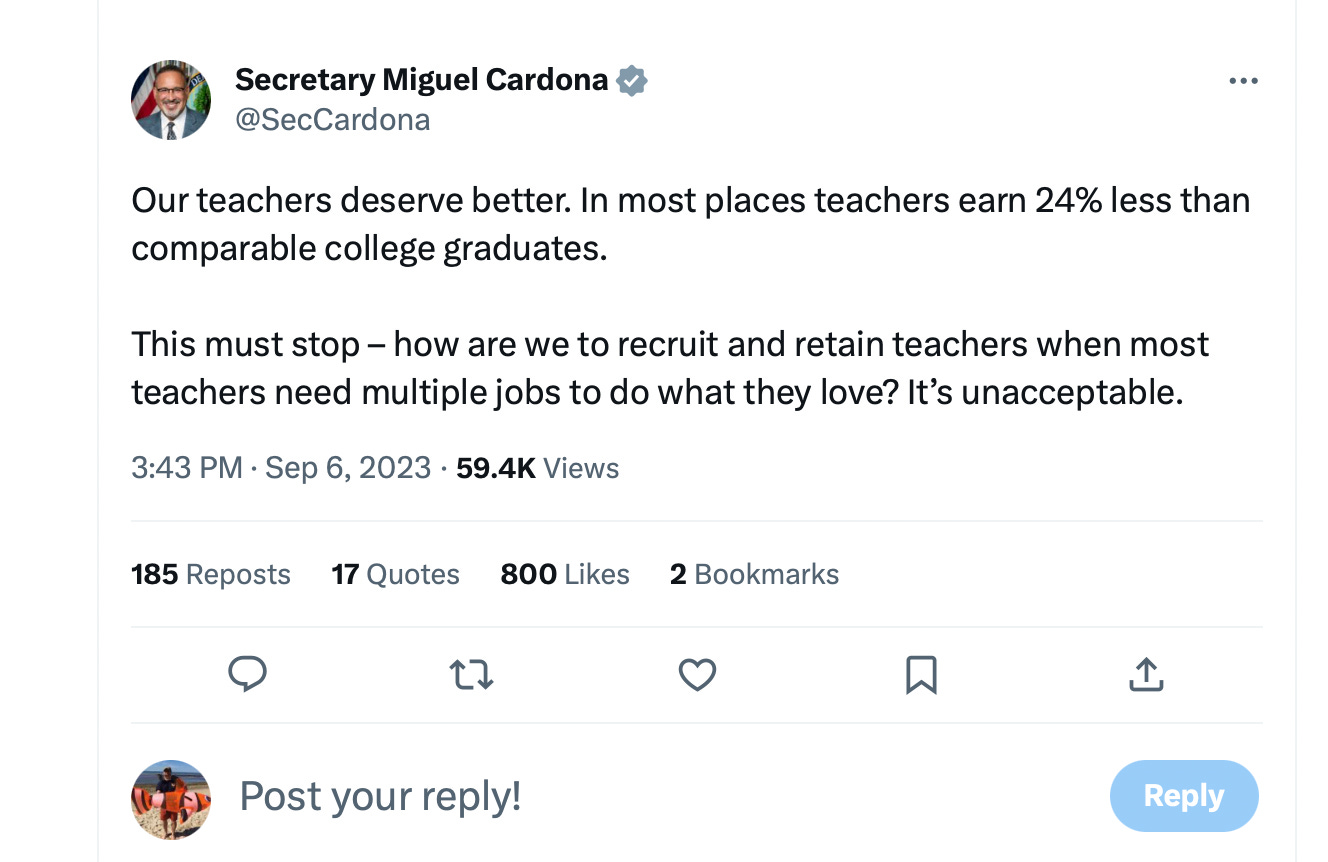Our Teacher Pay Debate, Still Dumb
Plus, Victor Reinoso and Austin Dannhaus on the Green River with a book recommendation...
The United States Secretary of Education tweeted this the other day:
To get right to it: That's wrong. More importantly it's also counterproductive if we want to pay teachers more (or get people to take education policy seriously or be able to take a serious stand on using evidence or....you get the idea). We do have a teacher compensation problem, yes, but it's a lot more complicated than political rhetoric, and especially political rhetoric in 280 characters.
Why is it wrong? Well for starters second jobs are a good talking point but a fractional issue in practice. Less than one in five teachers taking a second job during the school year and one in three in the summer is not "most." It's also not a huge source of income. It's actually more common among private school teachers. The seasonal patterns and patterns among different teachers might not be what you'd expect either.
More fundamentally, the very EPI analysis this rests on (which is funded by the teachers unions it should be noted) places the salary differential at 14% when you factor in benefits - defined benefit pensions, which are deferred compensation, being a crucial part of that although health care costs are also an issue. Still real, but not quite as compelling a tweet. But this part of compensation is a key part of this whole issue (another key part is overall numbers of teachers, more on that below). It's a significant part of why in many places public dollars for overall teacher compensation continue to steadily climb but teachers are not seeing this in their paychecks every month. You can't wish this part of the issue away or ignore it.
When people argue that a teacher can't pay their rent with a future pension, that's correct. But it's also why we have to have a conversation about total compensation and how it's structured not just assume away those - substantial - costs. In fairness, there is a long tradition of magic money in education conversations. People will say to you with a straight face that you just can't count capital costs when thinking about how much schools spend annually as though those costs are somehow completely unrelated to expenditures rather than just a different category. Cash compensation is what teachers experience most immediately but it's not the full picture of public expenditures or education finance.
Yet even accepting the 14% there are still some issues. This whole argument rests on a bunch of assumptions. One is how much teachers work each week and another is what professionals are comparable. It also conflates public and private school teachers. And here, as with all things teacher compensation related and generally American K-12 related, the key word you need to keep in mind is:
Variance
Teacher pay varies a lot by state and often quite a bit within states. The EPI analysis this whole narrative rests on shows the variance among states. Virginia is a really good (bad, you know what I mean) example of this intrastate variance. Comparable professions also vary a great deal. The market realities for a math, science, or computer science major are different than an elementary education major. You can't compare teachers to architects. These debates often rhetorically turn on the value of different jobs for society - teaching elementary school is really important and formative for students- rather than how the labor market values different things and the supply of labor. It's all too porous to be that useful.
Here's a little nugget you probably haven't heard. According to multiple sources, during the policy design of the Biden student loan forgiveness program (subsequently struck down by the Supreme Court) teacher salaries emerged as an issue. If you set the forgiveness levels for annual salary too low, say at something like $75k or even $90k that was more politically and substantively defensible than the $125k the policy landed on, you'd actually miss a lot of teachers with loans so there was pressure to keep the number high. In other words, while arguing publicly that teacher pay is too low the teachers unions were arguing behind the scenes to raise income limits on the forgiveness program because they were too low for some teachers. These points are not completely at odds, obviously, but they do point up how nuts this debate sometimes is.
And how much teachers work varies widely. It's absolutely absurd we have these strikes about hours, often contracted hours, of say 296 minutes of instructional time (yes it's measured to the minute, remember this is professional work...) while then arguing about the long hours. Some teachers work a lot on school work outside of school time, some don't. That's the reality, and I'm not confident you can just assume it comes out in the wash of averages. There is a whole debate about this you can Google if you care but self reported hours are not an ideal measure anyway. And I'm absolutely not convinced everyone is working a ton we somehow don't know about because if that were so their unions wouldn't fight tooth and nail not to extend the contracted day. They'd do the opposite, capture the time, so we could pay teachers more.
And that brings us to paying teachers more. We should in a lot of cases. It's a really fun but really challenging job. Especially right now as we try to unwind the damage of pandemic policies and practices. And there are clearly some labor market shortfalls. The shortage issue is also more nuanced than the public debate allows but there certainly are places we're not paying enough. But addressing all of this means doing some things we've been loath to do aggressively:
- Really Differentiate by type of role in ways that reflect labor market realities about different subjects, geographies, skill sets, and demand. And also making sure prospective teachers know this, we overproduce teachers in a lot of cases but we underproduce in some areas and subjects .This isn't an across the board problem so across the board solutions fall short. At best you get the peanut butter problem of education finance and policy where we spread everything around a little rather than doing a lot for those who need it.
- Engage honestly with choices. We've made a decision as a sector to prioritize quantity over quality with teachers and deemphasize productivity. As we've talked about here before, class sizes could be marginally larger and teachers would be earning a lot more. Instead, we've gone the other direction and there are obvious political and operational reasons for that. But it is a choice, a choice with trade-offs, and one policymakers need to engage or change more forthrightly. We could, just for instance, increase the size of math class while lowering it for English. But you don't hear too many of those conversations these days -which is weird given the demographic wave about to crash over schools to say nothing of the fiscal cliff ahead as the orgy of pandemic dollars wraps up.
- Engage with the challenge of total compensation. Teacher pensions don't work well for most teachers. Sometimes sort of not well, sometimes acutely. The debate about teacher pensions is a stupid binary between the status quo of defined benefit pensions or going entirely to 401(k) models. This is not the actual range of policy options or the dynamics of the issue. For starters you can have great 401ks or lousy pensions and vice versa. This issue is totally under-leveraged. It's a huge problem for the sector. Few funders have the ganas to take it on.
- Address finance overall. School finance is generally a hot mess. It's inequitable, inefficient, and often misaligned with the avowed goals of the education system and certainly the expectations of many families who assume a greater degree of fairness than actually exists - often along class and race lines. Federal categorical dollars play an important role here in addressing some shortfalls but the real action is in the states. There are compelling models - both substantively and politically about how we can do better and some great people leaning hard into this. But we won't fix compensation absent fixing the larger challenges.
Until we get serious about these elements this is largely going to be a debate of BS tweets and memes even as the profession strains under the challenges it's facing. And it seems like a place there could be some bipartisanship. Over the past few years Republican and Democratic governors have raised teacher pay - including in some surprising places. The federal role here is somewhat limited although the feds could certainly create some incentives through policy - something that has worked in the past on this issue. Even better, they could just use the bully pulpit to call attention to these issues - responsibly.
*This isn't something EPI does as far as I know or Secretary Cardona, but there are people in this debate who argue it's fair to compare teacher cash comp for 9 or 10 months to the 12 months of comp for other professionals because it's hard to find a short term job if you're teaching. This isn't baseless in my view - though I'm someone who thinks we should make the school year at once longer and more flexible for teachers, and again per the data above the whole extra job issue is more complicated. But then...these same people turn around and argue that teachers have to work these summer jobs and that's not OK. It's the kind of crazy-making rhetoric that makes people say, 'oh whatever, maybe we can do something about climate, I'll focus my efforts there.'
OK, it's still a summer Friday, certainly feels like one in most of the country, so your reward is fish porn:
Here's Austin Dannhaus on the Green River in Utah with a lovely trout. It's a fantastic and varied river that makes a long journey down to the Colorado near Canyonlands National Park. If you're looking for an epic account of river exploration it's hard to beat this account of John Wesley Powell's trip down the Green and Colorado. He did it without one arm, having lost his other at Shiloh fighting for the Union, or the amenities of modern raft trips. He went on to be the second director of the USGS - so a hero to all of us map nerds as well.
For a little fish flashback here's current Amazon executive and former Deputy Mayor of DC Victor Reinoso also on the Green from a few years ago.
Here, should you have time on your hands, is a one of a kind archive of hundreds of pictures of education types with fish. Send me yours!







